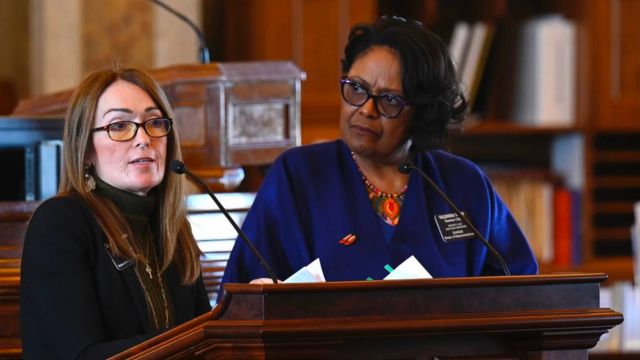Public education groups fiercely opposed the Kansas Senate’s budget for K-12 schools, resulting in its blockage on Thursday.
The proposed budget that fully funded schools and allocated $77.5 million in new funding for special education was rejected by the Kansas Senate with a vote of 12 to 26. However, the House had previously given a narrow approval to the bill earlier in the day.
Key advocates for public education, such as the Kansas Association of School Boards and the Kansas National Educators Association, the state’s largest teachers union, voiced their opposition to the measure. They argued that it was nothing more than an accounting trick that would deprive schools of the much-needed funding for disabled students.
In a statement on Wednesday, the groups expressed their concern about the bill’s lack of a comprehensive plan to fully fund special education. They pointed out that instead of providing a long-term solution, the bill only offers a one-time $77 million increase and relies on accounting tricks to create the illusion of full funding in the future.
The Legislature is expected to begin a weeks-long break on Friday without passing funding for public schools, as the bill has failed to gain support.
In the past few years, there has been a strong demand from public education advocates for a significant increase in funding for special education. Governor Laura Kelly, a Democrat, has put forth a proposal to address this issue by allocating an additional $375 million over the next five years, with $75 million being distributed annually.
The bill crafted by Republicans, instead of providing significant funding increases, allocated $77.5 million in new funds. In order to meet spending requirements without a substantial increase in funding, local discretionary dollars were counted as part of the state’s special education spending. This accounting maneuver may bring Kansas into compliance with the requirements.
A number of Republicans, along with Democrats, opposed the bill, stating that it would negatively impact their local school districts, which rely on the funding provided. They also expressed concerns that it could serve as a justification for the Legislature to allocate insufficient funds for special education in the years to come.
Rep. Bill Cliffford, a Garden City Republican, voiced his opposition to the bill and criticized the changes in the special education formula, describing them as nothing more than a “shell game.”
He expressed his concerns, stating that his school districts would eventually experience negative impacts.
Senate Democrats expressed their opposition to the bill, stating that it had not been thoroughly studied and had the potential to negatively impact districts throughout the state. “This is a matter of great concern for all of us,” said Sen. Cindy Holscher, a Democrat from Overland Park.
Republican supporters contended that the funds were intended for the benefit of special education students and, therefore, should be utilized accordingly.
Rep. Scott Hill, an Abilene Republican, expressed concern over the allocation of LOB money generated from the excess costs of special education students. He stated that for the past seven years, instead of being directed towards the special education fund where it should rightfully go, the funds have been diverted to the general fund, athletic fund, or used to increase the superintendent’s salary.

